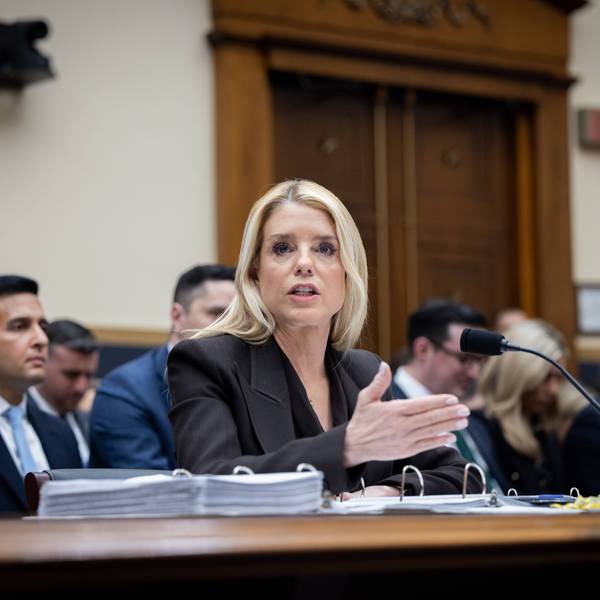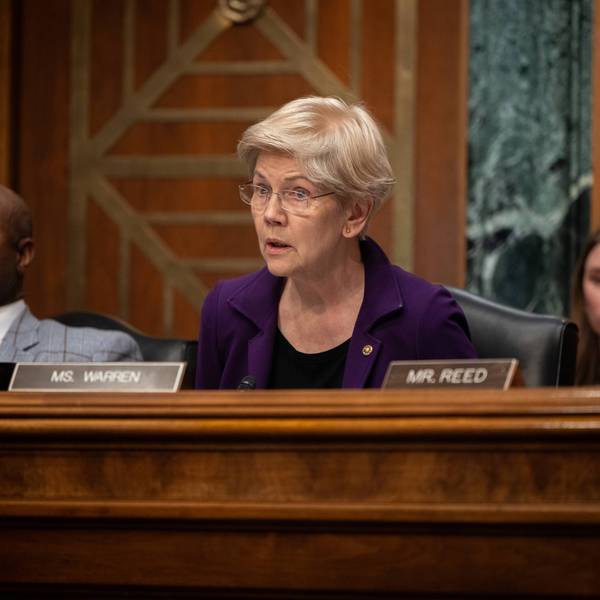An antitrust lawyer fired from the US Department of Justice last month accused Attorney General Pam Bondi's underlings on Monday of giving MAGA-aligned corporate lobbyists the ability to "rule" over antitrust enforcement.
Roger Alford, formerly the deputy assistant attorney general in the DOJ's antitrust division, was ousted in July, reportedly for "insubordination" after he objected to the involvement of politically connected lobbyists in the $14 billion merger between Hewlett-Packard Enterprise (HPE) and Juniper Networks.
The DOJ had sued in January to block the merger, arguing that HPE's acquisition of Juniper would unlawfully stifle competition, raise prices for consumers, and harm innovation, since the two entities control over 70% of the wi-fi relied on by large companies, hospitals, universities, and other entities.
But that suit was resolved in June in what the Capitol Forum described as a "highly unusual settlement" in which Bondi's chief of staff, Chad Mizelle, overruled the DOJ's antitrust chief, Assistant Attorney General Gail Slater, to allow the deal to settle.
At the time, left-wing consumer advocates, like Nidhi Hegde, executive director of the American Economic Liberties Project, argued that the deal was "a corrupt and politically rigged merger settlement," which came after political operatives tied to Trump lobbied on behalf of the company.
Despite still describing himself as a staunch MAGA loyalist, Alford likewise feels that the settlement was a "scandal."
In a speech delivered Monday at the Technology Policy Institute in Aspen, Colorado, he said senior DOJ officials "perverted justice and acted inconsistently with the rule of law" by allowing "corrupt lobbyists" to hijack the process.
According to disclosures from HPE, it hired multiple top Trump allies as lobbyists to advocate for the merger. These included MAGA influencer Mike Davis—a right-wing critic of Big Tech and a notorious legal operative responsible for many of Trump's judicial nominations—and Arthur Schwartz, a close adviser and confidante to Donald Trump, Jr. and JD Vance.
According to reporting from the conservative writer Sohrab Ahmari in UnHerd last month, which cites one unnamed senior official, the DOJ's merger settlement was the product of "boozy backroom meetings between company lawyers and lobbyists, on one hand, and officials from elsewhere in the Department of Justice, on the other."
As Ahmari explained:
"Boozy backroom deal" here isn't a figure of speech, by the way. It captures what literally took place, according to the former official, who described a meeting between government officials and lobbyists that took place at one of Washington's "private city clubs" over cocktails.
In an essay for UnHerd adapted from his speech, Alford berated these "MAGA-in-name-only lobbyists and the DOJ officials enabling them," who he said are "determined to exert and expand their influence and enrich themselves as long as their friends are in power."
The current DOJ, Alford continued, has allowed for the "rule of lobbyists" to supplant the "rule of law." While he says this was not true of those idealists serving with him in the antitrust division—including his embattled former boss, Slater—he says that others in the DOJ showed "special solicitude" to lobbyists they perceived to be on the "same MAGA team."
"Too often in the current DOJ," he said, "meetings are accepted and decisions are made depending upon whether the request or information comes from a MAGA friend. Aware of this injustice, companies are hiring lawyers and influence-peddlers to bolster their MAGA credentials and pervert traditional law enforcement."
Alford makes a distinction between these corrupt officials and those he calls "genuine MAGA reformers" who "strive to remain true to President Trump's populist message that resonated with working-class Americans."
While he does not group Bondi in with the officials he deems corrupt, he does blame her for having "delegated authority to figures—such as her chief of staff, Chad Mizelle, and Associate Attorney General-Designee Stanley Woodward—who don't share her commitment to a single tier of justice for all."
"Some progressives may blanche at Alford's praise for [US President Donald] Trump's populist messaging, and insistence that it has been subverted by top DOJ officials selling out to lobbyists," writes David Dayen in the American Prospect.
But Dayen notes that Alford's audience is not progressives and that he is instead "attempting to reach the president and his inner circle by playing on Trump's demand for total loyalty."
The merger between HPE and Juniper can still be stopped under the Tunney Act, which requires it to be reviewed by a federal judge to determine whether settlements brought in federal "antitrust" cases are in the "public interest."
While the Capital Forum says this process is typically a "rubber stamp," they wrote that "given the settlement's atypical substance and process, plus third parties who may be motivated to intervene and a judge who may be inclined to approach the review skeptically, what's normally a quick judicial signoff could turn into a fraught process with wide-reaching implications."
"Indeed, the court should block the HPE-Juniper merger," Alford said. "If you knew what I know, you would hope so, too."




